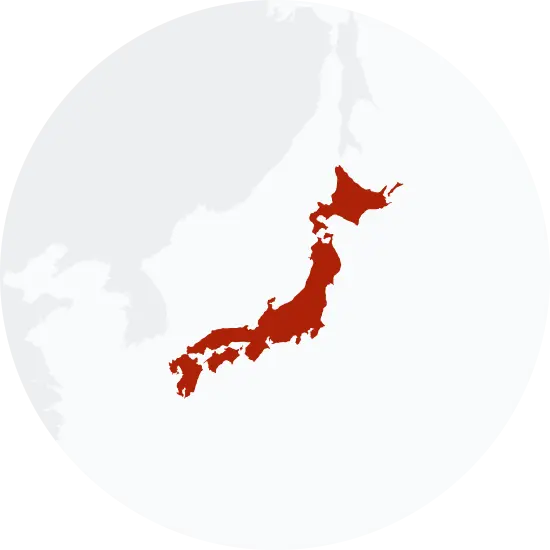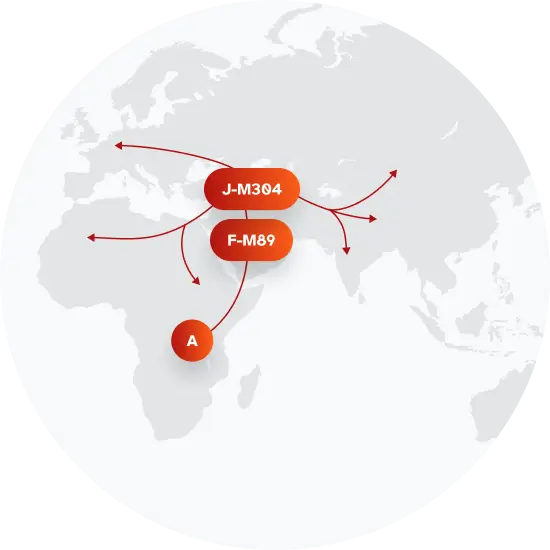Explore the Family Name Mori
How common is the last name Mori in the United States?
Based on the Decennial U.S. Census, the popularity of the surname Mori saw a slight increase between 2000 and 2010. In 2000, Mori was ranked 7,895 in terms of popularity, but it moved up to rank 7,831 by 2010, marking a 0.81% increase. The count of people bearing this surname also rose from 3,890 in 2000 to 4,228 in 2010, an 8.69% growth. However, the proportion of individuals with the Mori surname per 100,000 people slightly declined by 0.69%, from 1.44 to 1.43.
| 2000 | 2010 | Change | |
|---|---|---|---|
| Rank | #7,895 | #7,831 | 0.81% |
| Count | 3,890 | 4,228 | 8.69% |
| Proportion per 100k | 1.44 | 1.43 | -0.69% |
Race and Ethnicity of people with the last name Mori
The ethnic identity associated with the surname Mori also shifted within that decade according to the Decennial U.S. Census data. Notably, there was a decrease of 7.77% in the Asian/Pacific Islander group, dropping from 51.34% in 2000 to 47.35% in 2010. People identifying as two or more races increased by 15.63%, while those identifying as Hispanic and Black saw significant increases of 25.43% and 25.00%, respectively. Despite a minor decrease in the White population from 30.59% to 30.37%, there was a notable rise of 34.41% in the American Indian and Alaskan Native population, although their overall representation remains small.
| 2000 | 2010 | Change | |
|---|---|---|---|
| Asian/Pacific Islander | 51.34% | 47.35% | -7.77% |
| White | 30.59% | 30.37% | -0.72% |
| Hispanic | 11.52% | 14.45% | 25.43% |
| Two or More Races | 4.99% | 5.77% | 15.63% |
| American Indian and Alaskan Native | 0.93% | 1.25% | 34.41% |
| Black | 0.64% | 0.8% | 25% |
Mori ancestry composition
23andMe computes an ancestry breakdown for each customer. People may have ancestry from just one population or they may have ancestry from several populations. The most commonly-observed ancestry found in people with the surname Mori is Japanese, which comprises 36.4% of all ancestry found in people with the surname. The next two most common ancestries are Italian (13.5%) and French & German (12.2%). Additional ancestries include British & Irish, Spanish & Portuguese, Indigenous American, Ashkenazi Jewish, and Eastern European.
Ready to learn more about your ancestry? Get the most comprehensive ancestry breakdown on the market by taking our DNA test. Shop 23andMe
| ANCESTRY BREAKDOWN | COMPOSITION |
|---|---|
| Japanese | 36.4% |
| Italian | 13.5% |
| French & German | 12.2% |
| Other | 38.0% |

Possible origins of the surname Mori
Your DNA provides clues about where your recent ancestors may have lived. Having many distant relatives in the same location suggests that you may all share common ancestry there. Locations with many distant relatives can also be places where people have migrated recently, such as large cities. If a large number of individuals who share your surname have distant relatives in a specific area, it could indicate a connection between your surname and that location, stemming from either recent ancestral ties or migration.
Based on 23andMe data, people with last name Mori have recent ancestry locations spanning a few countries, mostly in Japan, and the United Kingdom of Great Britain and Northern Ireland.
| RECENT ANCESTRY Location | Percentage |
|---|---|
| Hiroshima Prefecture, Japan | 35.20% |
| Tokyo, Japan | 33.10% |
| Okinawa Prefecture, Japan | 31.70% |
| West Midlands, United Kingdom | 23.90% |
| Greater London, United Kingdom | 23.90% |
What Mori haplogroups can tell you
Haplogroups are genetic population groups that share a common ancestor on either your paternal or maternal line. These paternal and maternal haplogroups shed light on your genetic ancestry and help tell the story of your family.
The top paternal haplogroup of people with the surname Mori is J-M172, which is predominantly found among people with European ancestry. Haplogroup J-M172 is descended from haplogroup J-M304. Other common haplogroups include D-M116.1 and R-U152, which are predominantly found among people with East Asian & Indigenous American and European ancestry. Other surnames with similar common haplogroups are: Ott, Weber, Giglio, Miller, Wagner, Becker, Hartman, Hawkins, Schneider, Kline.
The most common maternal haplogroups of people with Mori surname are: H1, H, D4. These most commonly trace back to individuals of European ancestry.
 Paternal Haplogroup Origins J-M304
Paternal Haplogroup Origins J-M304
Your paternal lineage may be linked to some of the first farmers
The first farmers in western Eurasia lived in the Fertile Crescent, a region of the Middle East stretching from the Nile Delta to the Tigris and Euphrates rivers. With their new technology, they were able to live more sedentary lives, support larger populations, and build civilizations. They also began to move rapidly outwards from the Middle East. One of the earliest regions they expanded into was Armenia, a crossroads between the Middle East and northern Eurasia that was transformed into a fertile landscape at the end of the Ice Age. In addition to their culture, some of the men involved in this early migration carried haplogroup J-M172. In fact, their arrival in the region left genetic signatures that can still be seen in the J-M172 lineages found in Armenian men today, especially in Ararat Valley, Gardman, and Lake Van.
Your maternal lineage may be linked to Marie Antoinette
Because it is so dominant in the general European population, haplogroup H also appears quite frequently in the continent's royal houses. Marie Antoinette, an Austrian Hapsburg who married into the French royal family, inherited the haplogroup from her maternal ancestors. So did Prince Philip, Duke of Edinburgh, whose recorded genealogy traces his female line to Bavaria. Scientists also discovered that famed 16th century astronomer Nicolaus Copernicus traced his maternal lineages to haplogroup H.

What do people with the surname Mori have in common?
Spoiler alert: it's complicated. People with the same last name are usually no more genetically similar than a randomly sampled group of people from the same population. That said, people with the same surname are more likely to have similar ancestries than randomly sampled individuals. The reason is the tendency of people with similar cultural or geographical backgrounds to preferentially mate with one another. That's why people who share a surname may be more likely to share traits and tendencies in common than people within the general population. Check out the percentages below to see the prevalences of tastes, habits, and traits of people with your surname compared with prevalences among 23andMe users.
Preferences
Traits
Habits
Wellness
Are health conditions linked to the last name Mori?
The short answer is that, if there is an association between surname and health, it's usually more about your ancestry than your name. Individuals with a given surname are no more genetically similar than the general population but often have similar ancestries. The populations of people associated with those shared ancestries often have sets of genetic variations, also known as alleles, in common. Some of those alleles are associated with a greater likelihood of developing certain diseases.
Disease variant frequency by ancestry
Disease allele frequencies in populations associated with the surname Mori are shown below. Important Note: not everyone with a disease allele will develop these health condition













